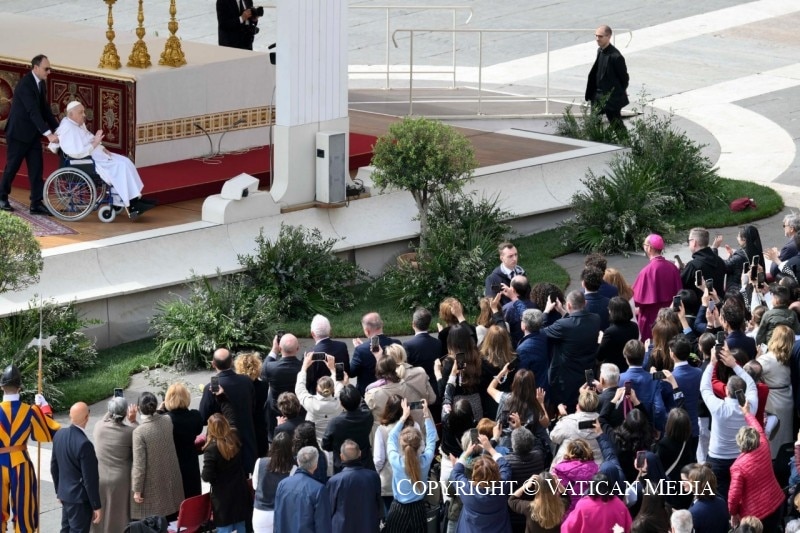Angelus: Pope Urges Faithful ‘to Watch’
Viewing Two Scenes With Jesus from Inside the Temple of Jerusalem

Pope Francis today urged the faithful “to watch” hypocrites and a widow, players in a scene inside the temple of Jerusalem.
The Pope’s commentary came before praying the noonday Angelus with the faithful gathered in St. Peter’s Square and listening via media around the world.
The scene came from the Gospel of the day in the 12th chapter of Mark. Jesus watches the wealthy giving large sums of money — and a poor widow giving two small coins. The Pope recalls that the wealthy strive for places of honor while the widow gave everything she had.
“Jesus watches the two scenes,” the Pope recalled “And it is specifically this verb – ‘to watch’ – that sums up his teaching: ‘we must watch out for’ those who live their faith with duplicity, like the scribes, so as not to become like them; whereas we must ‘watch’ the widow, and take her as a model. Let us reflect on this: to watch out for hypocrites and to watch the poor widow.”
Following is a working translation of the Pope’s commentary, provided by the Vatican:
Dear Brothers and Sisters, Buongiorno!
The scene described in the Gospel of today’s Liturgy takes place inside the Temple of Jerusalem. Jesus looks at what is happening in this, the most sacred of places; and he sees how the scribes love to walk around to be seen, greeted, and revered, and in order to have the places of honor. And Jesus adds that they “devour widows’ houses and recite long prayers in order to be seen” (cf. Mk 12:40). At the same time, another scene catches his eyes: a poor widow, precisely one of those exploited by the powers that be, puts in the Temple treasury “everything she had, her whole living” (Mk 12:44). The Gospel presents us with this striking contrast: the rich who give from their surplus wealth to make themselves seen, and a poor woman, who without seeming to, offers every little bit she has.
Jesus watches the two scenes. And it is specifically this verb – “to watch” – that sums up his teaching: “we must watch out for” those who live their faith with duplicity, like the scribes, so as not to become like them; whereas we must “watch” the widow, and take her as a model. Let us reflect on this: to watch out for hypocrites and to watch the poor widow.
First of all, to watch out for hypocrites, that is, to be careful not to base our life on the cult of appearances, externals, and the exaggerated care of one’s own image. And most importantly, to be careful not to bend faith around our own interests. In the name of God, those scribes covered up their own vainglory, and even worse, they used religion to cultivate their own affairs, abusing their authority and exploiting the poor. This is a warning for all time and for everyone, Church and society: never to take advantage of a specific role to crush others, never to make money off the backs of the weakest! And to watch out so as not to fall into vanity, so as not to be fixated on appearances, losing what is essential, and living superficially. Let us ask ourselves: do we want to be appreciated and gratified by what we say and what we do, or rather to be of service to God and neighbor, especially the weakest? We must watch out for falsehood of the heart, against hypocrisy which is a dangerous illness of the soul!
To heal this illness, Jesus invites us to watch the poor widow. The Lord denounces the exploitation of this woman, who, in making her offering, must return home without even the little she had to live on. How important it is to free the sacred from ties with money! But, at the same time, Jesus praises the fact that this widow puts all she has into the treasury. She has nothing left but finds her everything in God. She is not afraid of losing the little she has because she trusts in God’s abundance, who multiplies the joy of those who give. This is why Jesus proposes her as a teacher of faith: she does not go to the Temple to clear her conscience, she does not pray to make herself seen, she does not show off her faith, but she gives from her heart generously and freely. The sound of her few coins is more beautiful than the grandiose offerings of the rich since they express a life sincerely dedicated to God, a faith that does not live by appearances but by unconditional trust. Let us learn from her: a faith without external frills, but interiorly sincere; a faith composed of humble love for God and for our brothers and sisters.
And now let us turn to the Virgin Mary, who with a humble and transparent heart made her entire life a gift for God and for his people.
© Libreria Editrice Vatican
Related

Palm Sunday: “Father, into your hands I commend my spirit”
Exaudi Staff
13 April, 2025
2 min

“Jesus’ passion becomes compassion when we reach out to those who can no longer bear it”
Exaudi Staff
13 April, 2025
5 min

Pope Francis Sends a Message of Hope to the Young People of the UNIV 2025 International Congress
Exaudi Staff
11 April, 2025
5 min

Pope Francis continues his recovery at Santa Marta with signs of improvement
Exaudi Staff
11 April, 2025
1 min
 (EN)
(EN)
 (ES)
(ES)
 (IT)
(IT)

